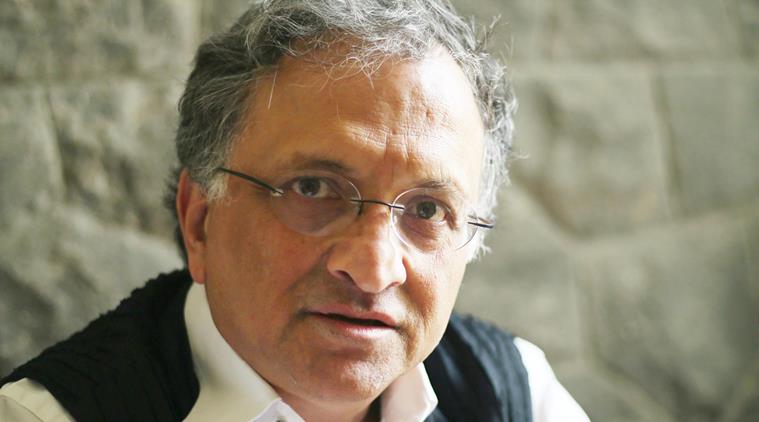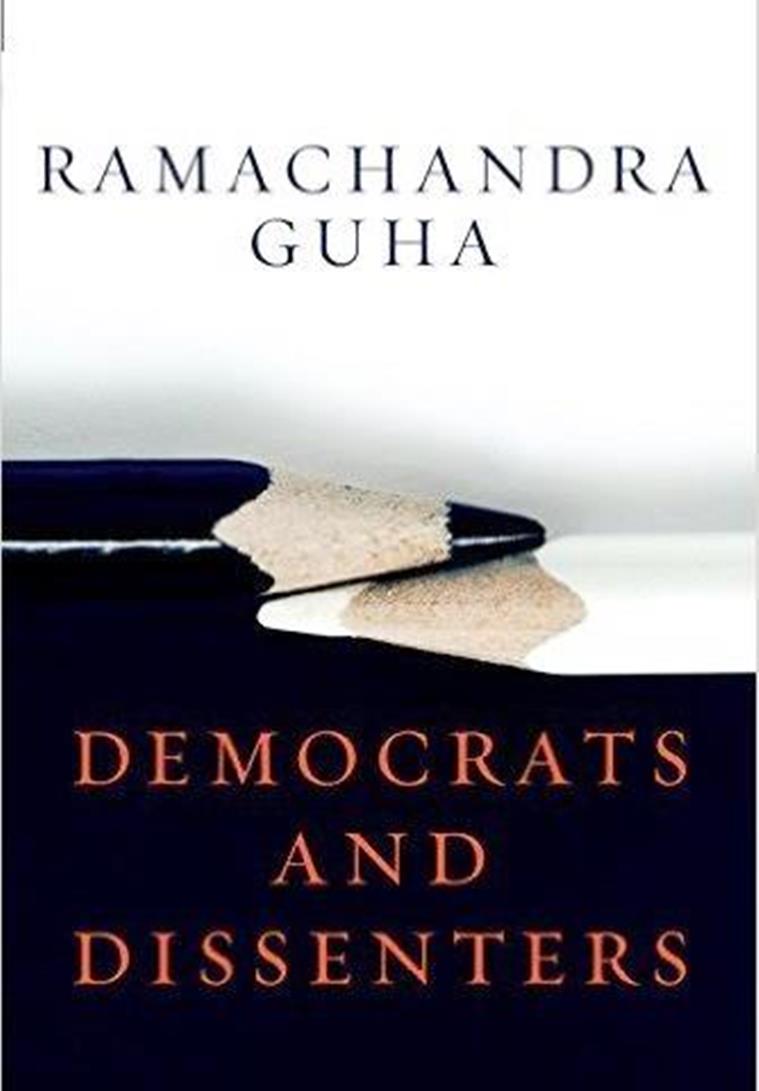- India
- International
‘This is a nationalism of paranoia and insecurity’: Ramachandra Guha
The historian on his new book, the death of the Congress and the Kashmir crisis.
 Indian politics is increasingly become instrumental believes Ramachandra Guha. (Express Photo by Tashi Tobgyal)
Indian politics is increasingly become instrumental believes Ramachandra Guha. (Express Photo by Tashi Tobgyal)
In an essay on threats to freedom of expression in your new book, Democrats and Dissenters, you point out that the political class has never stood up for freedom of speech. Why is it that politicians find it unprofitable to espouse it? Is it then, as is often accused, just an elitist concern?
Throughout the freedom movement, because there were curbs on freedom of speech imposed by the British — newspapers were often fined, sometimes banned, editors were arrested—there were continuous promises made by nationalists that when we become free, we would have freedom of speech. Gandhi said famously in Young India in 1921 that when we are free, we would remove the sedition law. He also gave a definition of freedom of speech, which says unless you explicitly advocate violence, whatever you say [should not be proscribed.]
Why do Indian politicians not support it? Like many other betrayals of the ideals of the founding figures, this is one. Indian politics is increasingly become instrumental. It is now merely about winning elections. In fact, you are told, Modi has won for five years, you cannot criticize him. Or Mamata has won for five years, you cannot criticize her. But democracy is a process of continuous introspection, questioning and reform. This is a part of the degeneration of the Indian democracy into an elections-only democracy.
Do you think it reflects on the people as well, that we have not demanded it of our politicians that they protect our freedom?
Writers and intellectuals are also complicit. Too few of them are also non-aligned. I criticized Sahmat about not speaking up for Taslima Nasreen in West Bengal. The RSS will say we are in favour of protecting Salman Rushdie’s freedom of speech, and not Perumal Murugan or MF Husain’s. I don’t think the people are to blame. PEN is an organization that stands for freedom of expression. India, the largest democracy, does not have a single unit. There is clearly something wrong with us as writers and intellectuals that we cannot work across party lines or beliefs. Often, the Left is as guilty as the right — if you go back to the 1970s, the way Nurul Hasan behaved, the way liberal intellectuals were marginalized from ICSSR, ICHR, or vice-chancellorships, if you look at the conduct of the CPM in Calcutta University, which was destroyed by promoting only CPM intellectuals.
Do you see the first amendment to the Constitution in 1951 then as the start of the slide?
That was a bad precedent. It should have been undone by the late 1950s, when India was secure and not going to Balkanise. It was a failure of Nehru.
You are even-handed in blaming the BJP and the Congress when it comes to not defending the right to speech. But do you not see a difference in the way the two parties and their politics work in this respect?
[Yes] on intellectual work, generally, and not just on freedom of expression. The BJP is far more ideologically driven, and its standards are much lower. Academic posts, from the Congress onwards, have become instruments of patronage. So the best person is not appointed, say, as director of the Nehru Memorial Museum and Library, but the second or the third best person is because she/he is seen as more compliant to the first family. But with the BJP, it is the 20th or 30th best person. It is a party hostile to creative work, intellectual work, to thinking, to reflection. It is a profoundly anti-intellectual and Philistine party. Look at the statements our culture minister makes. Institutions that have been built up painstakingly-the ASI, the National Museum, the NGMA– are steadily being undermined. This government [is guily], more than the Vajpayee government. Because Vajpayee somewhere he believed that the arts, culture and scholarship mattered. This government does not think they matter. Economic growth and military might matter. That’s it.

In your essay comparing the insurgencies in Kashmir and Sri Lanka, you say the “Indian arrogance towards Kashmiris have been at times so brutal and extreme as to make reasoned and non-violent protest…perhaps impossible.” How do you see the recent uprising in Kashmir?
I think it is the gravest situation we have faced in Kashmir in many years. It’s partly the accumulation of mistakes made by previous governments. The movement for azaadi in Kashmir is increasingly inflected by Islamic fundamentalism. Today, again there is a rise of Hindu fundamentalism in India. Maybe there are wise heads in the government who want to reach out to Kashmir. But that is undermined by the activities on the ground by the Sangh Parivar, who are not fringe elements. Gau raksha now is a part of official policy in Haryana and Maharashtra, as your own paper has reported. Social media has [broadcast the] horrific images of the pellet gun injuries and, the excesses of the Indian security forces are known everywhere in the rest of India. In Bangalore in the 1990s, I had no clue of what the army was doing. Kashmir gets to see images of the flogging of Muslims and Dalits on the issue of cow. And a Kashmiri Muslim says Muslims are not safe in India and is pushed further towards the jihadis. What was a movement for autonomy, dignity and self-respect becomes a movement for Islamic pride. Let’s be clear: Burhan Wani died for Allah, not for Kashmir. It’s a very tricky and complicated situation where the two fundamentalisms reinforce and fuel each other.
And how to move towards solving this? The first step would be for the Prime Minister and the RSS to say that we completely disavow our past positions on Article 370. It will stay and it is inviolate. In fact, we will find ways of making it more effective so that Kashmirirs have more autonomy. That is the basic minimum that has to be done to retrieve the situation. It is a complicated situation which needs sagacious statesmanship. But some of the remarks by this government after the Uri attack–what Ram Madhav said–was appalling. If Arnab Goswami was to say that, it was fine. If a BJP affiliated journalist were to say it in the Pioneer, it was fine. But for the general secretary of the party responsible for Kashmir to make such a crude and irresponsible statement shows the unwisdom in the government.
How do you look upon the extraordinary fast of Irom Sharmila which just ended? How has the Indian state come off in this encounter?
It is linked to something common in Kashmir and Manipur, which is the ceding of control of civilian authorities to the army. Hence AFSPA, hence immunity. It is a commentary on how our policy in these border areas is dominated by military considerations. Coming back to Kashmir, when Omar Abdullah said withdraw AFSPA in a few districts and keep it in the border areas if you will, why did the Congress government at the Centre not agree? That could have set a precedent in the border areas, which could have been applied in Manipur. These are mistakes we are still paying for.
 The cover of Ramachandra Guha’s new book ‘Democrats and Dissenters’.
The cover of Ramachandra Guha’s new book ‘Democrats and Dissenters’.
The epigraph to your book is a quote by Benedict Anderson: “No one can be a true nationalist who is incapable of feeling ashamed of her [or his] government commits crimes, including those against their fellow citizens.” How do you look at this recent debate on being anti-national?
The nationalism of Gandhi, Nehru and Ambedkar was inflected by a sense of shame. They were ashamed at our treatment of women and Dalits. Indian nationalism as conceived by them was a work in progress. It was not flawless, it was always imperfect. And the attempt would be to always strive to correct these imperfections. As opposed to a nationalism that says: “India is great”, “India is perfect”, “mera bharat mahaan”, “Bharat mata ki jai” or “worship the flag”. The idea that there should be a 207 foot high flag in every central university which you can see from everywhere and it will make you proud is utterly farcical. It is a nationalism of insecurity and paranoia parading as a nationalism of might and self-confidence.
How do you see the JNU debate in this light? What did it achieve and what did it cede?
Personally, I think the JNU debate is not as important to someone living in Bangalore. It was covered because the media is in Delhi.
No, because there were sedition cases slapped on students for shouting slogans.
Sedition cases have been slapped elsewhere also. It, of course, was a mistake. It was an excessive, knee-jerk reaction of the state. Its importance, for good or for ill, was magnified because the media is here. It is easier to cover something in JNU and not go elsewhere.
The protests at Hyderabad University were also covered.
Hyderabad was covered for a different reason. It was more important, there was clear victimization there. But I didn’t follow the JNU debate very carefully. I do think that to reclaim a nationalism that is reflective and interrogative is important for the Left and liberals. It has allowed the right and the RSS to say: only we are patriotic, only we are nationalists.
I was recently reading JP on Kashmir. Here is a leader the Sangh Parivar respects. He thinks that our treatment of Kashmir is a black mark on Indian democracy, which it is. Arnab Goswami would call this hero anti-national. He says. ‘How long can we hide the facts on Kashmir?’ ‘To suppress the Kashmiris by force’, he says, ‘is a suicide of the soul of India’. Leaders like JP truly loved the country, they wanted to reform it. They were fearless in criticizing its failings. They had a sense of shame. But they were nationalists.
Do you still believe that the Congress needs to be Gandhi-mukt?
That was my belief till recently, till about a year ago. That it needs to rid of the Gandhis. But now I think the Congress is dead. It is terminally ill. It’s done what it has to do and it should now die. And Indians will find a way to occupy that political space.
The RSS has spoken of reviewing the Constitution. What do you think of that idea?
It was there in the last BJP government. Vajpayee’s government appointed a “Constitution review committee” because the RSS was saying it had to reexamined. They appointed as the chairman of the committee a man called MN Venkatachaliah, a former chief justice of India, from my home town Bangalore. He was a devout Hindu in his personal life, who did puja twice a day. He came to Delhi, got a Lutyens bungalow for two years of his term. They must have thought that because of his personal, spiritual leanings, this man would be inclined to the RSS point of view. He consulted scholars across the board, specialists, legal scholars, and basically wrote a report saying nothing needs to be done to the Constitution. The RSS didn’t want to hear that, but maybe Vajpayee did. He could be quite clever that way.
Apr 26: Latest News
- 01
- 02
- 03
- 04
- 05




































